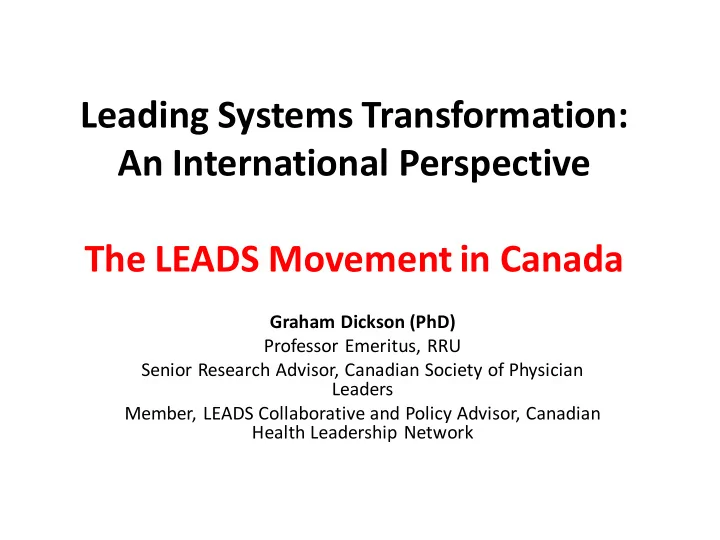

Leading Systems Transformation: An International Perspective The LEADS Movement in Canada Graham Dickson (PhD) Professor Emeritus, RRU Senior Research Advisor, Canadian Society of Physician Leaders Member, LEADS Collaborative and Policy Advisor, Canadian Health Leadership Network
Presenter Disclosure • Presenter: Graham Dickson (PhD) • No relationships with commercial interests
Value of a Common Language Surely if we are to really lead the future of healthcare we must believe that our own generic problem solving skills, grounded in the scientific method but tempered in the art of medicine are key to the future. The contention therefore is that if /when medical leaders are to lead the way forward in this century towards the transformation and improvement of healthcare across the globe then we must work between us towards a simple yet clear vocabulary that we can share with our clinical, management and technical colleagues around at every meeting and every report. Does such a framework exist? Shannon, T. September 30, 2014. Medical Leadership – moving from the dark side towards the age of enlightenment. Retrieved on September 13, 2015 from http://frectal.com/2014/09/30/medical-leadership- moving-from-the-dark-side-towards-the-age-of-enlightenment/
Defining Leadership…
Canadian Health Leadership • In Canada, for most health organizations, the musical score for health leadership is LEADS
Leadership — as LEADS Five domains Four capabilities per domain.
LEADS Framework D EVELOP S YSTEMS COALITIONS TRANSFORMATION • Purposeful Partnerships/Networks • Systems Thinking • Commitment to Customer Service • Encourage Innovation • Mobilize Knowledge • Orient to Future • Politically Astute • Champion Change A CHIEVE E NGAGE OTHERS RESULTS • Set Direction • Foster Development of • Strategic Alignment L EAD SELF others • Take Action/Implement • Contribute to creation of • Assess & Evaluate healthy organizations • Communicate Effectively • Build Teams • Are Self Aware • Manage Themselves • Develop Themselves • Demonstrate Character A foundational element for health leadership development
Defining features of LEADS • For all • Simple, yet complex • Capabilities • Enables discussion • Systems perspective • Change focus Patients included!
Caring g identi tity.. ty...
Distributed not heroic leadership... Formal AND informal leaders • Both positional AND informal • Like an orchestra
The Validity of LEADS Construct validity • Initial work was research based (literature; action research) • PHSI study (CIHR) • Subsequent studies validate Face validity • Appeal • Utility • Used in 10 provinces in Canada • CHLNet and LEADS Canada created to use LEADS for health reform. • Influential in Australia, New Zealand, UK
LEADS: Uses in Systems Transformation
CHLNet: Better Leadership, Better Health – Together 42 national, provincial, local member partners ➢ Governments ➢ Regional Health Authorities ➢ National Health Organizations ➢ Provincial Organizations ➢ Universities ➢ Patients ➢ Private sector 14
15 LEADS Collaborative Enhance Capacity and Capabilities ➢ LEADS Canada ➢ Licenses ➢ Programs ➢ Exchange Days ➢ In House Specialist Program ➢ Community of Practice ➢ LEADS Certification ➢ CHE ➢ CCPE
LEADS CANADA
Australia Health Workforce Australia • 80 licenses New South Wales (HETI) • • Degree program in Tasmania Website — resources, videos • • Future in doubt with new government LD programs for hospitals • 360 • International group of experts
LEADS/UK medical standards LEADS UK Leadership and Management Standards for Medical Professionals Lead Self Self • • Self aware Self-awareness and self-development • • Manages self Personal resilience, drive and energy • Demonstrates character • Develops self Engage Others Team Player/Team Leader • • Foster development of others Effective teamwork • • Contributes to a healthy organization Cross-team collaborations • Communicates effectively • Builds teams Achieve Results Corporate Responsibility • • Set direction Corporate team player • • Align vision, mission, vision values and Corporate culture, improvement and evidence to make decisions innovation • Take action to implement decisions • Assess and evaluate Develop Coalitions and Systems Leadership Systems Transformation
Toronto International Summit on Leadership Education for Physicians
Leadership Development Programs ➢ University programs: e.g., U of A Leadership of Health Systems Improvement Graduate Certificate ➢ CMA and CSPL programs for physicians ➢ ACFP Primary Care Network reform ➢ Medical Society of PEI program PEI: “ …facilitate training of MSPEI members in leadership skills to enable meaningful consultation with respect to the management of delivery of change within facilities or across the province within Health PEI.” 20
LEADS S as a model for change ge Outcomes Achieve Results Develop Engage Relationships Coalitions Others Future vision Systems Lead Trans- Self Change Dynamics formation
LEADS as a Change Planner: EHR 22
Thank you Graham Dickson gdickson@royalroads.ca
Recommend
More recommend